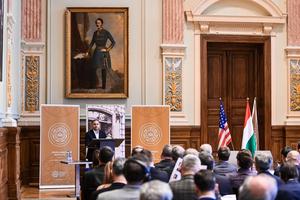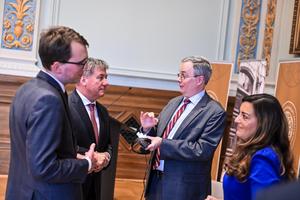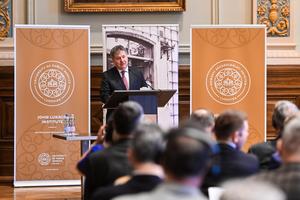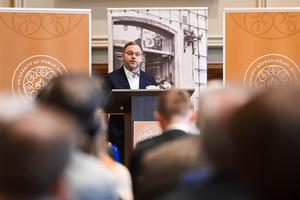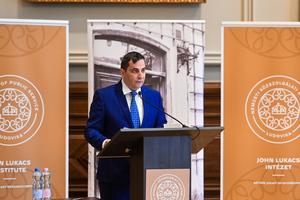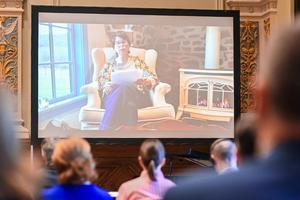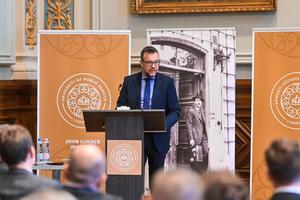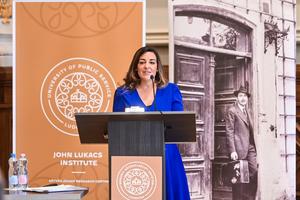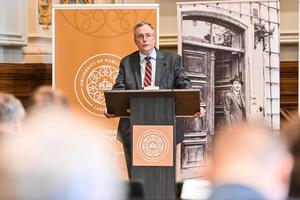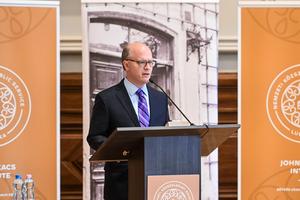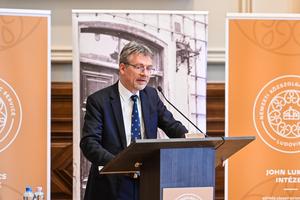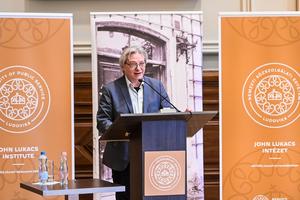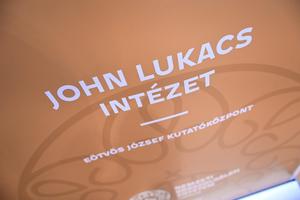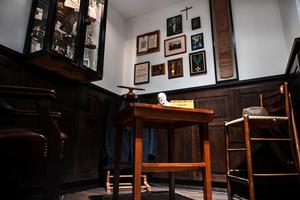"John Lukacs has an intellectual legacy worth passing on to future generations," was emphasised at the conference titled "Spirit and Character – John Lukacs at 100" held at the Ludovika University of Public Service (LUPS) on January 31. The event also marked the inauguration of the John Lukacs Institute, coinciding with the centenary of the Hungarian-born historian's birth.
"Although John Lukacs immigrated to the United States with his family at the age of 22 in 1946, he preserved his Hungarian identity and Central European heritage throughout his life," highlighted Gergely Deli, the rector of the Ludovika University of Public Service, during the event. He recalled that in December 2021, the John Lukacs lounge, located in the Side Building of LUPS, was ceremoniously dedicated, showcasing numerous personal items and selected pieces from the historian's legacy. Starting in 2024, the John Lukacs Institute will be responsible for appropriately preserving his intellectual heritage. Gergely Deli emphasised that the Institute's primary goal is to conduct strategic research and programs related to international relations, as well as to organise high-quality international conferences, contributing to the development of LUPS' and Hungary's international connections.
Balázs Orbán, the political director of the Prime Minister, expressed the desire to establish an institution in the academic life representing Lukacs's thinking and perspective. He explained that Ludovika could stand out among other universities because it was specifically established to serve the community, with its main goal being to support the functioning of the Hungarian state. "The next phase of construction has now arrived, placing LUPS on the international stage to make the unique Hungarian voice heard with the rest of the world," emphasised the political director.
Gergely Prőhle, the program director of the John Lukacs Institute and director of the Habsburg Otto Foundation, stressed that Lukacs is a crystallisation point of American conservatism. His works help understand the nature of transatlantic relations, providing an encyclopedic picture of contemporary American conservative thinking, its European roots, and its impact on Hungarian political thought.
Throughout the full-day conference, participants revisited the historian's body of work through various panel discussions. Pál Hatos, the director of the Eötvös József Research Center for Central Europe at LUPS, referred to John Lukacs as an exemplary figure of democratic knowledge, transcending both left and right-wing ideologies.
Wilfred McClay, a professor at Hillsdale College in the United States, highlighted in a video message that Lukacs did not fit into the typical American conservative mould, as his ideal was the 19th-century bourgeois society. Richard M. Gamble, also a professor at Hillsdale College, described the Hungarian-born historian as a rebel who stood up for tradition.
Ferenc Hörcher, the head of the Institute for Political Science and Political Philosophy at LUPS, raised the question of how great personalities shape history. Jeffrey O. Nelson, the executive director of the Russell Kirk Center for Cultural Renewal, emphasised that John Lukacs believed in local cultures but was by no means a nationalist. Susan Hanssen, an instructor at the University of Dallas, spoke about the Hungarian-born historian remaining a European gentleman throughout his life. "He is still read today because he has an intellectual legacy worth passing on to future generations," she emphasised.
Máté Botos, a lecturer at Pázmány Péter Catholic University, believed that Lukacs was more European than American and characterised himself more as a reactionary than a conservative. Máté Gali, a historian at the Mathias Corvinus Collegium School of Society and History, wouldn't be surprised if John Lukacs spoke out against the Biden administration. Given the importance of patriotism in his work, he believed the historian would vote for Trump.
The event also touched on the diplomatic relationship between John Lukacs and George F. Kennan. According to Richard M. Gamble, both men were outsiders, even among conservatives, drawn to European literature and culture.
Tibor Glant, a professor at the University of Debrecen, spoke about the significant impact of John Lukacs's work on the Hungarian people. According to M. Nagy Miklós, the editor-in-chief of Helikon Publishing, the Széchenyi Prize-winning historian, who also received the Corvin Chain, was an excellent writer with a keen ability to portray characters. He was difficult to categorise both politically and in terms of genre, being too much of a historian for writers and too much of a writer for historians.
Text: Éva Harangozó
Photo: Dénes Szilágyi
